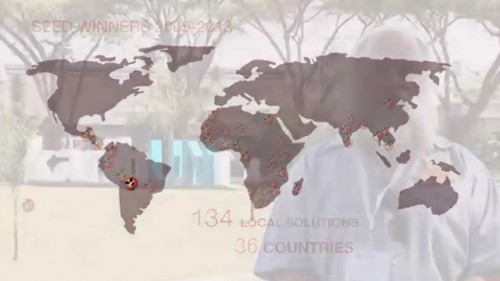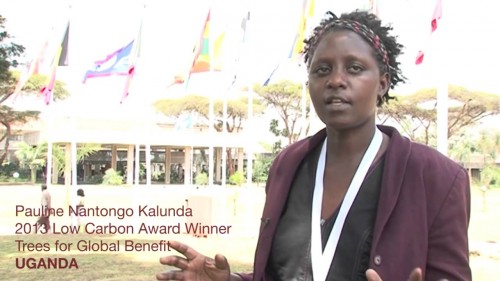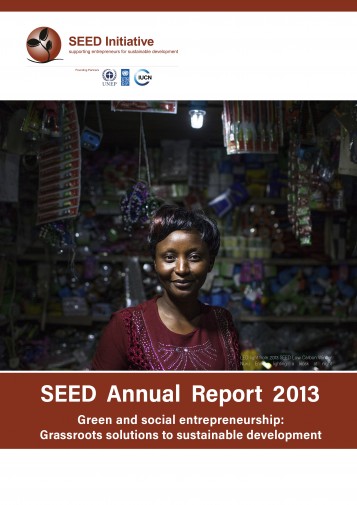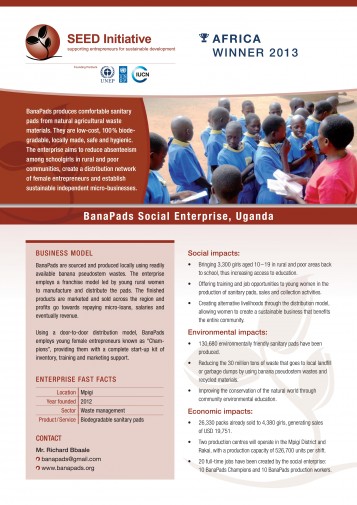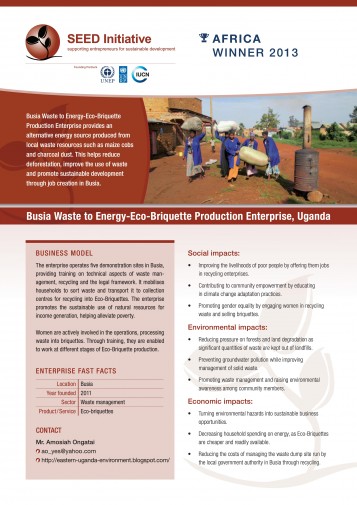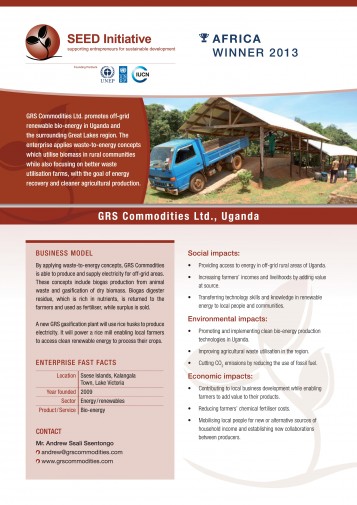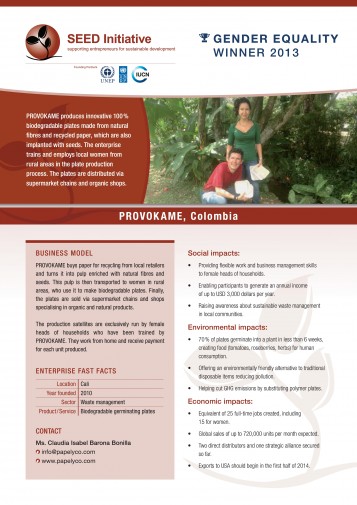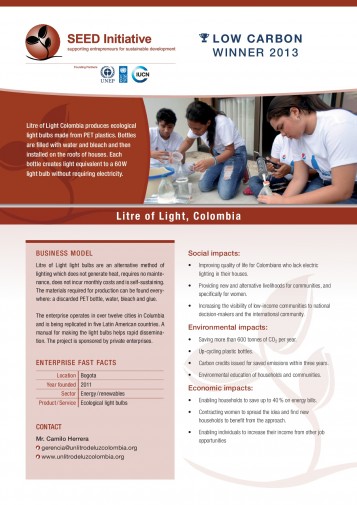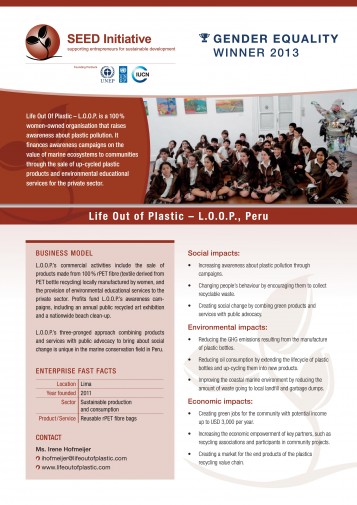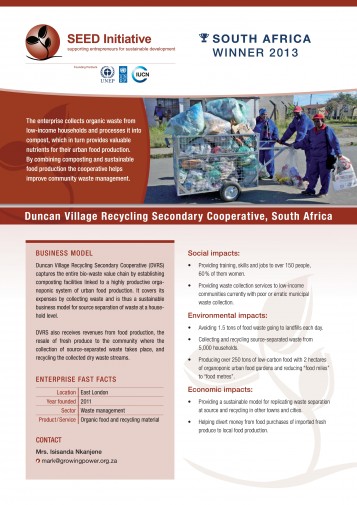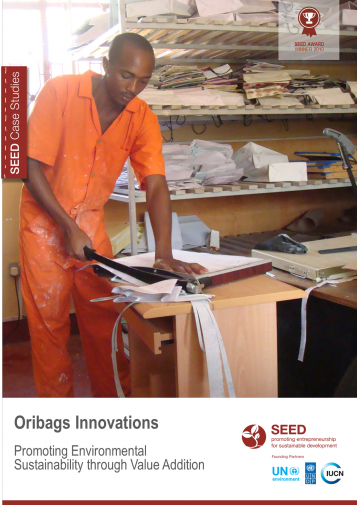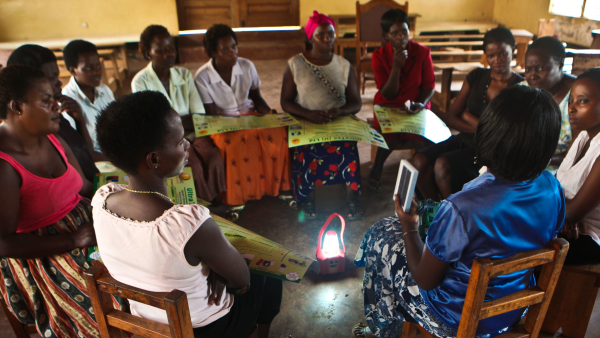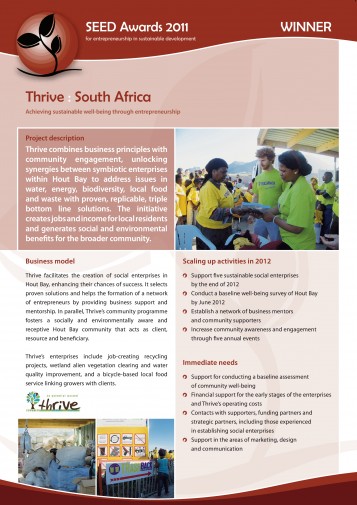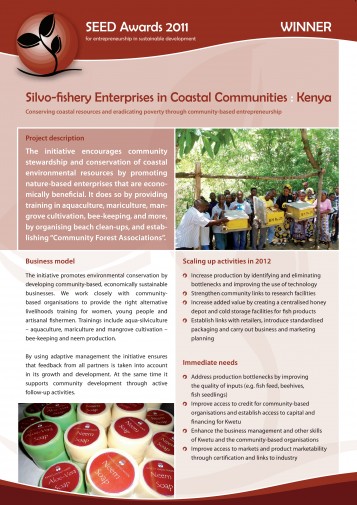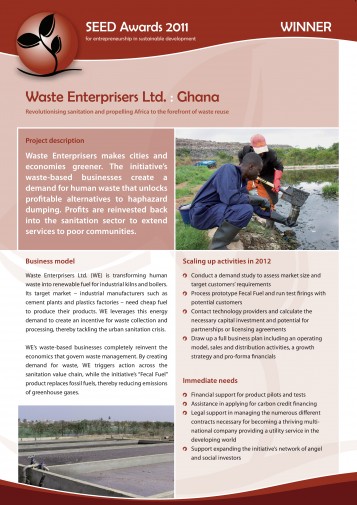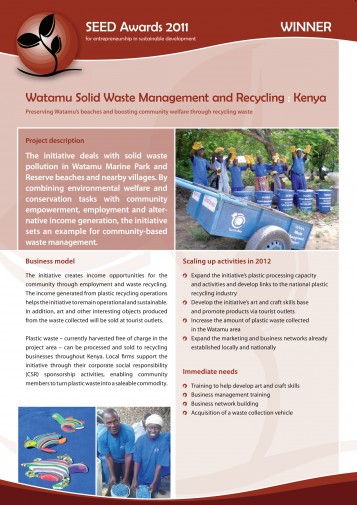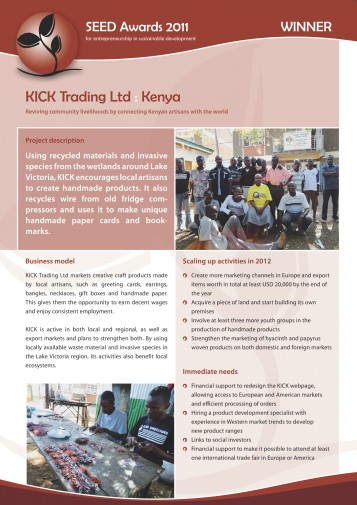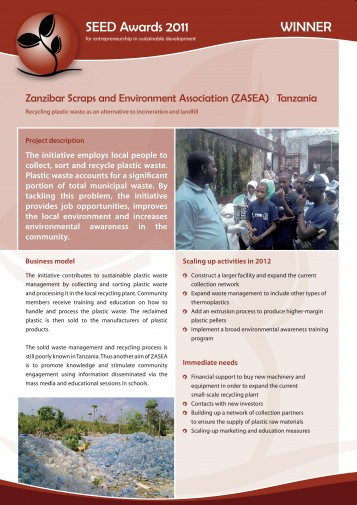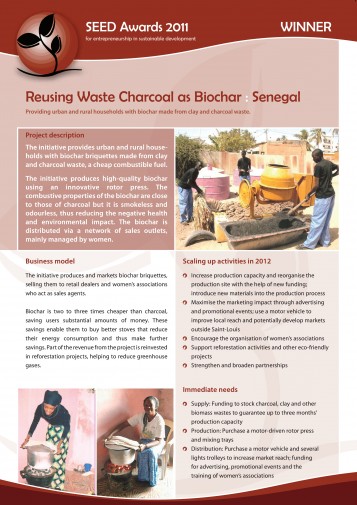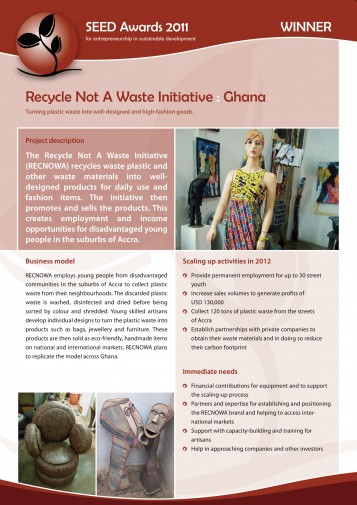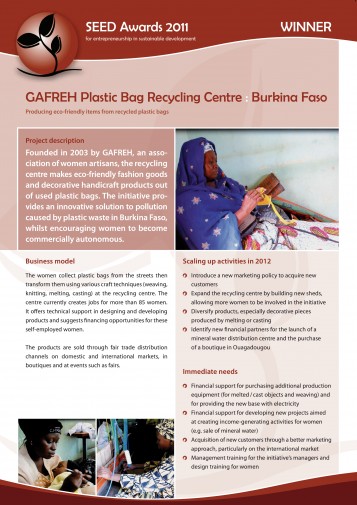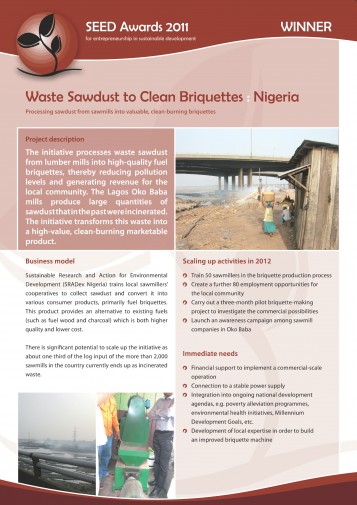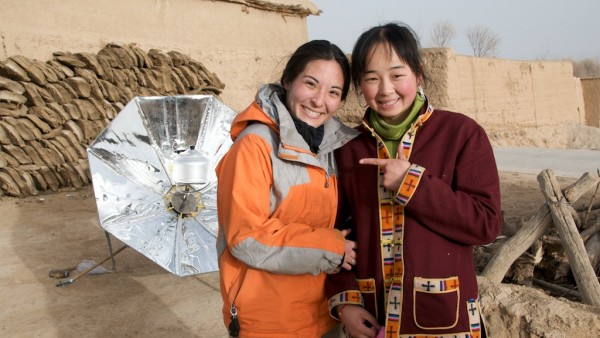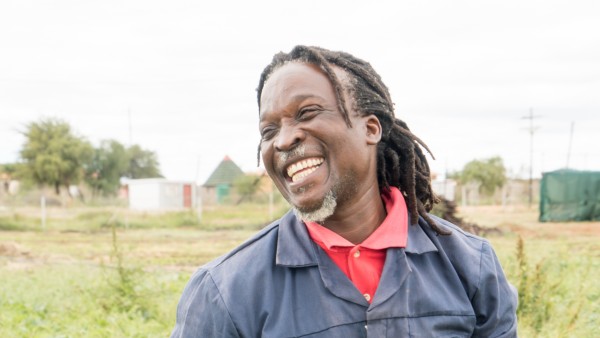SEED Awards 2014 - A Call for Applications
Published: 11 February 2014
Start-up social and environmental entrepreneurs who have developed innovative products or services and are working with local communities can win a tailor-made business support package through the 2014 SEED Awards, which open for nominations today. Read more
SEED Awards 2014 - Apply by 8 April!
Published: 01 January 2014
The SEED Initiative has just launched the 2014 SEED Awards to support entrepreneurs for sustainable development. Read more
SEED Annual Report 2013
Published: 18 December 2013
Looking back, 2013 has been a particularly good year for SEED, a year marked particularly by the selection of the 34 new SEED Winners - remarkable exemplars of social and environmental entrepreneurs at the grassrootsand by growing interest internationally in the programme, but also by new partnerships to build on those that have been essential in SEED’s growth so far. Read more
SDGs:

















Enterprise Brief: BanaPads
Published: 31 August 2013
BanaPads produces comfortable sanitary pads from natural agricultural waste materials. They are low-cost, 100 % biodegradable, locally made, safe and hygienic. The enterprise aims to reduce absenteeism among schoolgirls in rural and poor communities, create a distribution network of female entrepreneurs and establish sustainable independent micro-businesses. Read more
SDGs:







Enterprise Brief: Busia Waste to Energy-Eco-briquette Production Enterprise
Published: 31 August 2013
Busia Waste to Energy-Eco-Briquette Production Enterprise provides an alternative energy source produced from local waste resources such as maize cobs and charcoal dust. This helps reduce deforestation, improve the use of waste and promote sustainable development through job creation in Busia. Read more
SDGs:









Enterprise Brief: GRS Commodities Ltd
Published: 31 August 2013
GRS Commodities Ltd. promotes off-grid renewable bio-energy in Uganda and the surrounding Great Lakes region. The enterprise applies waste-to-energy concepts which utilise biomass in rural communities while also focusing on better waste utilisation farms, with the goal of energy recovery and cleaner agricultural production. Read more
SDGs:







Enterprise Brief: PROVOKAME
Published: 30 August 2013
PROVOKAME produces innovative 100 % biodegradable plates made from natural fibres and recycled paper, which are also implanted with seeds. The enterprise trains and employs local women from rural areas in the plate production process. The plates are distributed via supermarket chains and organic shops. Read more
SDGs:





Enterprise Brief: Fundación Un Litro de Luz Colombia
Published: 30 August 2013
Litre of Light Colombia produces ecological light bulbs made from PET plastics. Bottles are filled with water and bleach and then installed on the roofs of houses. Each bottle creates the light equivalent of a 60 W light bulb without requiring electricity. Read more
SDGs:





Enterprise Brief: Life Out Of Plastic - L.O.O.P.
Published: 30 August 2013
Life Out Of Plastic – L.O.O.P. is a 100 % women-owned organisation that raises awareness about plastic pollution. It finances awareness campaigns on the value of marine ecosystems to communities through the sale of up-cycled plastic products and environmental educational services for the private sector. Read more
SDGs:







Enterprise Brief: Duncan Village Secondary Recycling Cooperative
Published: 30 August 2013
The enterprise collects organic waste from low-income households and processes it into compost, which in turn provides valuable nutrients for their urban food production. By combining composting and sustainable food production the cooperative helps improve community waste management. Read more
SDGs:







Case Study: Oribags Innovations
Published: 07 September 2012
Oribags Innovations (U) Ltd is a Ugandan private enterprise which makes hand-made paper bags, printing paper and jewellery from agricultural wastes. Read more
SDGs:









2011 SEED Gender and Equality Award winner recognised at the Rio+20 UN Women's side event
Published: 14 June 2012
Three of the 2011 SEED Winners will be showcasing their initiative as examples of innovative women-led enterprises. Read more
SDGs:













Enterprise Brief: Women Environment Preservation Committee (WEPCO)
Published: 30 August 2011
The initiative seeks to enhance environmental conservation while generating income from recycled household waste, mainly in Kathmandu Valley. Women are provided with business and waste management training and access to micro-credit loans, and are encouraged to form conservation groups across the country. Read more
SDGs:







Enterprise Brief: Thrive
Published: 30 August 2011
Thrive combines business principles with community engagement, unlocking synergies between symbiotic enterprises within Hout Bay to address issues in water, energy, biodiversity, local food, and waste with proven, replicable, triple bottom line solutions. The initiative creates jobs and income for local residents and generates social and environmental benefits for the broader community. Read more
SDGs:









Enterprise Brief: Upscaling the siliviculture based enterprises of coastal communities in Kenya
Published: 30 August 2011
The initiative encourages community stewardship and conservation of coastal environmental resources by promoting nature-based enterprises that are economically beneficial. It does so by providing training in aquaculture, mariculture, mangrove cultivation, bee-keeping, and more, by organising beach clean-ups, and establishing “Community Forest Associations” Read more
SDGs:







Enterprise Brief: Waste Enterprisers
Published: 30 August 2011
Waste Enterprisers makes cities and economies greener. The initiative’s waste-based businesses create a demand for human waste that unlocks profitable alternatives to haphazard dumping. Profits are reinvested back into the sanitation sector to extend services to poor communities. Read more
SDGs:







Enterprise Brief: Watamu Community Solid Waste Management and Recycling Enterprises
Published: 30 August 2011
The initiative deals with solid waste pollution in Watamu Marine Park and Reserve beaches and nearby villages. By combining environmental welfare and conservation tasks with community empowerment, employment and alternative income generation, the initiative sets an example for community-based waste management. Read more
SDGs:









Enterprise Brief: GebRaa
Published: 29 August 2011
Using recycled materials and invasive species from the wetlands around Lake Victoria, KICK encourages local artisans to create handmade products. It also recycles wire from old fridge compressors and uses it to make unique handmade paper cards and bookmarks. Read more
SDGs:









Enterprise Brief: Plastic Waste Recycling as an Alternative to Burning and Landfilling
Published: 29 August 2011
The initiative employs local people to collect, sort and recycle plastic waste. Plastic waste accounts for a significant portion of total municipal waste. By tackling this problem, the initiative provides job opportunities, improves the local environment and increases environmental awareness in the community. Read more
SDGs:







Enterprise Brief: BRADES
Published: 29 August 2011
The initiative provides urban and rural households with biochar briquettes made from clay and charcoal waste, a cheap combustible fuel. Read more
SDGs:





Enterprise Brief: Recycle Not A Waste Initiative – RECNOWA
Published: 29 August 2011
The Recycle Not A Waste Initiative (RECNOWA) recycles waste plastic and other waste materials into welldesigned products for daily use and fashion items. The initiative then promotes and sells the products. This creates employment and income opportunities for disadvantaged young people in the suburbs of Accra. Read more
SDGs:







Enterprise Brief: Centre de Recyclage des Sachets Plastiques du GAFREH
Published: 29 August 2011
Founded in 2003 by GAFREH, an association of women artisans, the recycling centre makes eco-friendly fashion goods and decorative handicraft products out of used plastic bags. The initiative provides an innovative solution to pollution caused by plastic waste in Burkina Faso, whilst encouraging women to become commercially auto nomous. Read more
SDGs:







Enterprise Brief: Sawdust Entrepreneurial Initiative Among Oko-baba Communities In Lagos
Published: 29 August 2011
The initiative processes waste sawdust from lumber mills into high-quality fuel briquettes, thereby reducing pollution levels and generating revenue for the local community. The Lagos Oko Baba mills produce large quantities of sawdust that in the past were incinerated. The initiative transforms this waste into a high-value, clean-burning marketable product. Read more
SDGs:







From bamboo bikes to biomass briquettes: UNEP unveils SEED Award Winners
Constance Hybsier Source: UN Environment
A novel solar device that turns waste heat into electricity in rural China, a Ugandan business that manufactures stationary from agricultural waste, a bamboo bicycle project in Ghana and a female-run business in South Africa making a hand-held laundry device that saves water are among the 30 winners of the 2010 SEED Awards, the United Nations Environment Programme (UNEP) announced today. Read more
SDGs:











Announcement: Meet the 2010 SEED Winners!
Published: 03 November 2010
The SEED Initiative is thrilled to announce its 2010 SEED Award Winners! From bamboo bicycles to fly-fisheries, from businesswomen's collectives to inspired youth, these entrepreneurs are building a more sustainable world, starting in their own communities. Read more
SDGs:










